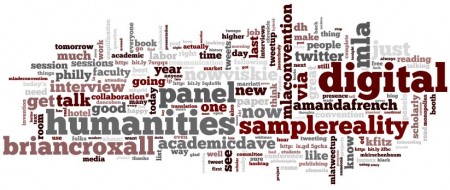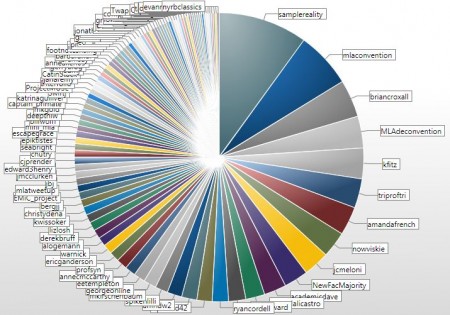I’ve learned from following several digital humanities conferences from afar the past year (including Digital Humanties 2009 and THATcamp 2009) that the Twitter archive of a conference back-channel can be unreliable. Twitter’s default search stream for any hashtag is extremely ephemeral, and that impermanence poses a problem for conference participants and observers, as well as future scholars, students, and journalists who might want to browse, search, extract, and data-mine what can be a rich, though niche, historical record.
So in anticipation of the Modern Language Association’s 2009 conference in Philadelphia, I set up a TwapperKeeper archive of all posts on Twitter marked with the hashtag #MLA09. I also began archiving the material on my own computer, using a program called The Archivist. (I’m into redundancy, especially when it comes to backing up data.) Anybody can export the collected tweets from Twapperkeeper as a compressed file, but I’m also posting here my own archives.
The first is an XML file of the over 1,600 tweets marked with the #MLA09 hashtag, dating from November 28, 2009 all the way to just about midnight on December 31, 2009: #MLA09 (I’ve zipped the xml file for easier downloading).
Second is an Excel version of the file, which has stripped away some of the XML tags, but is a more reader-friendly document: MLA09.xls
There is also a Google Docs version of the file:
I hope people find these archives useful. You can easily create some superficial data visualizations, such as the word cloud pictured above [larger version], but I imagine some more sophisticated analysis can be done as well. Even a simple pie chart [larger version] can reveal user activity at a glance:
My own high visibility is mostly due to the satirical “tips” about the MLA I posted in the days running up to the conference. And notice that two of the most active Twitterers were only virtually present at the conference: Brian Croxall and Amanda French, who both made substantial contributions to the intellectual discourse of the conference even with — or, more accurately, because — of their absences.
Pairing Brian’s bleak analysis of what the profession is now euphemistically calling “contingent” faculty with Amanda’s vision of a grassroots movement to amplify scholarly communication through social networking suggests that the MLA conference has the potential to be more diffuse, more rhizomatic, more meaning making in the future, something I’ll be proposing a few ideas about soon.


Thanks for making this data available, Mark. The open-source scholar rides again!
Crud. I just lost all credibility by not writing “these data,” didn’t I?
Actually, where you lost points was saying “open-source professor” instead of naked professor.
[…] in the Digital Humanities. Ultimately I agree with Mark Sample (@samplereality), who posted an analysis of the MLA Tweets and Matt Kirschenbaum(@mkirschenbaum) who argued via Twitter that this meme/theme was some what […]
#MLA10 Tip: Use the word “rhizomatic” whenever possible. Rhizomatic rhizomatic.
I agree, #MLA10 has the chance to be the most rhizomesque conference ever.
Way back in 2009 I used the dearly departed TwapperKeeper to archive #mla09 http://t.co/ITvuGweyAv #mla15 #s398